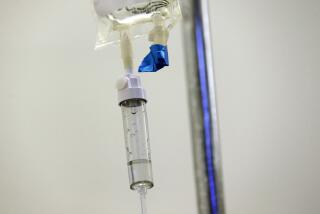Stock Dips as ICN Warns of Decreased Demand for Ribavirin
- Share via
As ICN Pharmaceuticals Inc. prepares to split into three companies, the drug maker is warning that demand for its hottest drug may cool off.
Royalties from ICN’s hepatitis drug ribavirin, which surged 48% in the third quarter, could stall as regulators evaluate an improved treatment for the disease, chief executive Milan Panic said Monday.
“Doctors are warehousing patients and waiting for the new treatment,” Panic said in an interview after the company’s annual shareholders meeting in New York.
Panic declined to assign a dollar figure to the expected slowdown or discuss its potential impact on the bottom line. In the third quarter, ICN’s royalties from ribavirin jumped to $49 million from $33 million a year earlier.
The prospects for slower sales have put a damper on ICN’s stock. Share traded as high as $41.75 on Oct. 20, but closed Monday at $26.50, down $1.69 a share on the New York Stock Exchange.
Under ICN’s proposed restructuring plan, the unit that will control the rights to ribavirin is considered the crown jewel. This segment alone eventually could be worth as much as $4 billion, nearly double the entire company’s market capitalization now, analysts have estimated.
Investor nervousness over the stock’s near-term prospects stem from the announcement by ICN’s partner, Schering-Plough Corp., that it plans to seek permission from the U.S. Food and Drug Administration to market the new Hepatitis C treatment, which combines its Peg-Intron drug with ICN’s ribavirin.
Schering-Plough sells a combination of ribavirin and Intron A called Rebetron in the United States.
The new treatment requires fewer weekly injections and has fewer side-effects, said Michael Tong, an analyst at First Union Securities in New York.
If the new therapy is approved, ICN’s royalties should increase substantially because the treatment also includes ribavirin, Panic said.
The shareholder meeting comes two months after Panic bowed to shareholder pressure and agreed to a restructuring scheme that would greatly reduce his role.
The 70-year-old former prime minister of Yugoslavia was reelected chairman for another three years. But shareholders also approved a resolution by dissidents urging the company to install more independent directors.
Although Panic said he hopes to begin spinning off ICN units early next year, the entire company also remains on the block.
Panic has declined to comment on any discussions, saying only that he has yet to receive an offer he would consider.
Two sources close to the company said, however, that ICN and generic drug manufacturer Watson Pharmaceuticals in Corona held merger talks for about four months. The discussions ended recently, according to an analyst familiar with negotiations.
Watson officials did not return calls for comment.
ICN also has received inquiries from at least three other companies, an analyst said.
Panic said Monday that ICN could regain legal control of its Yugoslavia plant, once an integral part of the company’s operations, within three months.
Company managers now operate the plant, which ICN believes can generate profits of $10 million to $15 million by 2002 on sales of $100 million. In 1992, the facility generated sales of $326 million, about 68% of ICN’s total revenue.
Panic has been battling to regain control of the company’s biggest factory ever since troops of his political nemesis, then-Yugoslav president Slobodan Milosevic, seized control of the facility about two years ago.
*
Bloomberg News contributed to this report.
More to Read
Inside the business of entertainment
The Wide Shot brings you news, analysis and insights on everything from streaming wars to production — and what it all means for the future.
You may occasionally receive promotional content from the Los Angeles Times.








